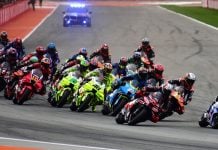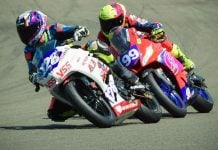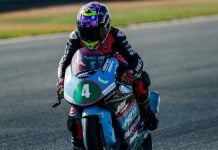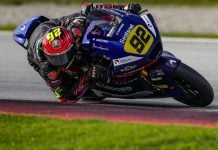FISHERMEN’S TALES It’s difficult to imagine two more contrasting sports the peace and tranquillity of fishing against the frenetic pace of world championship motorcycle racing. But, according to Ronald ten Kate and Katsuaki Fujiwara of the Winston Ten Kate Honda team, it is that very contrast that makes the two activities so mutually compatible. As team manager and World Supersport rider respectively, the pair is hooked on fishing as the perfect antidote to the everyday pressures of running a race team and riding a high performance Honda CBR600RR; and round two of the 2005 championship gives both the perfect opportunity to indulge. The Australian round is always looked forward to by riders and teams alike. Phillip Island, nestling 180 kilometres south east of Melbourne, is about as perfect a location as you could find to go racing. The technically demanding circuit is surrounded by quite stunning scenery and sea views and the relaxed pace of life is perfect to offset the rigours of competition. The seas surrounding the island, where the Bass Strait runs into the Pacific Ocean, also offer a quite different selection of fish to those found in Holland, where ten Kate and Fujiwara return home between races. And both have used this season’s visit to Phillip Island to find some sharks. “I began fishing with my father when I was about eight years old,” says ten Kate. “He taught me all about it but, as his business started to grow and he had less and less time to spend on it, he gave me his rods and I carried on.” The advantage with Holland, he concedes, is that there is plenty of water everywhere and, because everyone travels by bicycle, it was easy for the young ten Kate to get to the nearest canal just 500m from his house. “I loved the sensation of catching fish,” he continues, “and I became obsessed with recording each one species, size, date it was caught and so on. I suppose it was my first experience of data-logging, which is now such an important aspect of the team’s performance!” Fujiwara’s introduction to the sport came a little later, when he was in his early teens, and it was also his father who taught him. “We lived near the sea,” he says, “and there was also a lake nearby. But I didn’t do so much fishing back then as I do now.” Fujiwara had other distractions such as the pocket bikes he’d been racing since the age of six and his passion for fishing wasn’t re-kindled until seven years ago. “I was in one of the thousands of games arcades at home in Japan,” he explains, “and there was a computerised version of big game fishing. You have the rod, which is real, but the sea and everything else is on the screen. It was very realistic and exciting so I went and bought some equipment so I could do it for myself again.” Rather than sea fishing, however, Fujiwara opted for a lake near his home town of Chiba; and instead of big game fish, he set his target on the black bass. “It requires constant work and full concentration,” he says, “a little like fly fishing because the black bass feeds on the surface. I very quickly learned to love it again.” Despite the competitive nature of their current profession, however, neither Ronald ten Kate nor Fujiwara have been greatly motivated by fishing competitions. Ten Kate won a few organised by his school “No trophies, just a matter of honour!”, he says and Fujiwara recently entered one in Japan in which he came second by the small margin of 50g. Like his Japanese rider, ten Kate went for many years without picking up a rod, concentrating instead on a successful motocross career. “My racing was beginning to get serious,” he says, “so between the ages of 14 and 30 I just didn’t have time for it.” But it was Phillip Island’s charms that got him back into the sport three years ago, when he witnessed a local shark specialist losing his rod and tackle to a big fish. “It triggered the old bug in me again,” he continues, “and I just went straight to a fishing shop and bought about 200 Euros’ worth of equipment. The adrenalin rush is completely different to racing and it allows me to stop thinking about work completely. Also, when you get that detached from everyday life, you can sometimes see things more clearly.” He now also has a new fishing pal in Fujiwara, who lives close to the Winston Ten Kate Honda workshop in Niewleusen in Holland, where the pair fish for pike in the canals. “I just have to pick up the phone and he’s there,” says ten Kate. “We also have a little competition each time if I win he has to clean my car, and if he wins I have to clean his race bike!” Recent form allowed Fujiwara the pleasure of watching his team manager working hard to polish his Honda CBR600RR after a fishing expedition on the Arabian Gulf during February’s first 2005 World Supersport round in Qatar. He is also hoping to pass on his passion to his two-year-old son Hiroto, having already bought him a rod, tackle and, more importantly, a small life jacket. “At the moment, he just uses the rod to hit things,” laughs Fujiwara, “so maybe I’ll wait a little while!” For the Japanese ace, however, fishing remains a great way to relax, as well as offering a huge excitement. “When you catch a big one, it’s a real thrill,” he says. “I think my heart is beating faster then than it does on the start line for a race!”
Ten Kate Team Manager, Fujiwara Take Love Of Fishing To Phillip Island
Ten Kate Team Manager, Fujiwara Take Love Of Fishing To Phillip Island
© 2005, Roadracing World Publishing, Inc.






